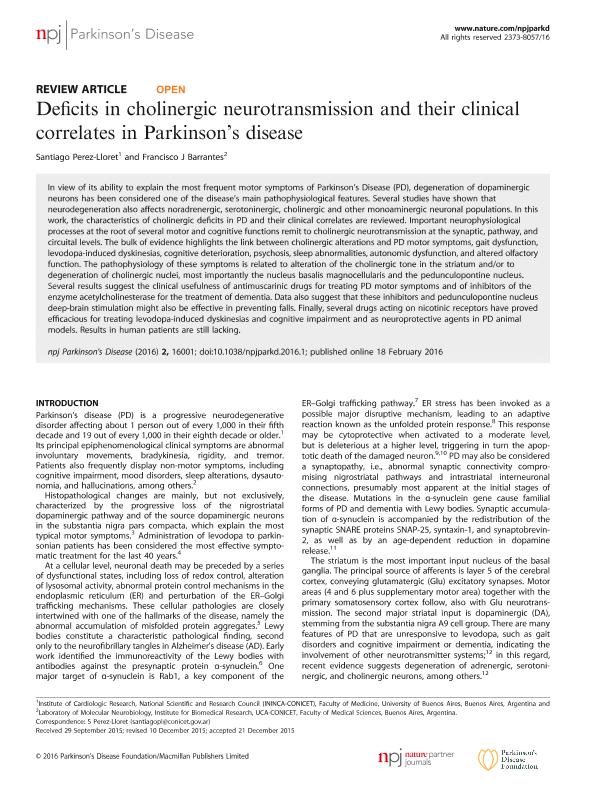Mostrar el registro sencillo del ítem
dc.contributor.author
Pérez Lloret, Santiago

dc.contributor.author
Barrantes, Francisco Jose

dc.date.available
2018-03-19T21:08:15Z
dc.date.issued
2016-02
dc.identifier.citation
Pérez Lloret, Santiago; Barrantes, Francisco Jose; Deficits in cholinergic neurotransmission and their clinical correlates in Parkinson's disease; Nature Publishing Group; Parkinson's Disease; 2; 2-2016; 1-12; 16001
dc.identifier.issn
2373-8057
dc.identifier.uri
http://hdl.handle.net/11336/39289
dc.description.abstract
In view of its ability to explain the most frequent motor symptoms of Parkinson’s Disease (PD), degeneration of dopaminergic neurons has been considered one of the disease’s main pathophysiological features. Several studies have shown that neurodegeneration also affects noradrenergic, serotoninergic, cholinergic and other monoaminergic neuronal populations. In this work, the characteristics of cholinergic deficits in PD and their clinical correlates are reviewed. Important neurophysiological processes at the root of several motor and cognitive functions remit to cholinergic neurotransmission at the synaptic, pathway, and circuital levels. The bulk of evidence highlights the link between cholinergic alterations and PD motor symptoms, gait dysfunction, levodopa-induced dyskinesias, cognitive deterioration, psychosis, sleep abnormalities, autonomic dysfunction, and altered olfactory function. The pathophysiology of these symptoms is related to alteration of the cholinergic tone in the striatum and/or to degeneration of cholinergic nuclei, most importantly the nucleus basalis magnocellularis and the pedunculopontine nucleus. Several results suggest the clinical usefulness of antimuscarinic drugs for treating PD motor symptoms and of inhibitors of the enzyme acetylcholinesterase for the treatment of dementia. Data also suggest that these inhibitors and pedunculopontine nucleus deep-brain stimulation might also be effective in preventing falls. Finally, several drugs acting on nicotinic receptors have proved efficacious for treating levodopa-induced dyskinesias and cognitive impairment and as neuroprotective agents in PD animal models. Results in human patients are still lacking.
dc.format
application/pdf
dc.language.iso
eng
dc.publisher
Nature Publishing Group

dc.rights
info:eu-repo/semantics/openAccess
dc.rights.uri
https://creativecommons.org/licenses/by-nc-sa/2.5/ar/
dc.subject
Parkinson'S Disease
dc.subject
Acetylcholine
dc.subject
Neurodegeneration
dc.subject
Treatment
dc.subject
Pathophysiology
dc.subject.classification
Medicina Critica y de Emergencia

dc.subject.classification
Medicina Clínica

dc.subject.classification
CIENCIAS MÉDICAS Y DE LA SALUD

dc.subject.classification
Inmunología

dc.subject.classification
Medicina Básica

dc.subject.classification
CIENCIAS MÉDICAS Y DE LA SALUD

dc.title
Deficits in cholinergic neurotransmission and their clinical correlates in Parkinson's disease
dc.type
info:eu-repo/semantics/article
dc.type
info:ar-repo/semantics/artículo
dc.type
info:eu-repo/semantics/publishedVersion
dc.date.updated
2018-03-19T17:27:26Z
dc.journal.number
2
dc.journal.pagination
1-12; 16001
dc.journal.pais
Reino Unido

dc.description.fil
Fil: Pérez Lloret, Santiago. Consejo Nacional de Investigaciones Científicas y Técnicas. Oficina de Coordinación Administrativa Houssay. Instituto de Investigaciones Cardiológicas. Universidad de Buenos Aires. Facultad de Medicina. Instituto de Investigaciones Cardiológicas; Argentina
dc.description.fil
Fil: Barrantes, Francisco Jose. Pontificia Universidad Católica Argentina ; Argentina. Consejo Nacional de Investigaciones Científicas y Técnicas; Argentina
dc.journal.title
Parkinson's Disease
dc.relation.alternativeid
info:eu-repo/semantics/altIdentifier/doi/http://dx.doi.org/10.1038/npjparkd.2016.1
dc.relation.alternativeid
info:eu-repo/semantics/altIdentifier/url/https://www.nature.com/articles/npjparkd20161
Archivos asociados
